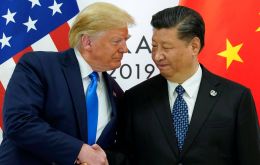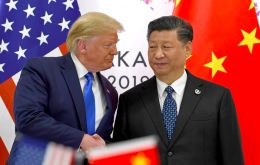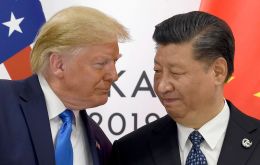MercoPress. South Atlantic News Agency
Tag: Tariffs
-
Wednesday, February 19th 2020 - 06:49 UTC
China lifts tariffs on 696 products imported from the US, including farm and energy products

China said on Tuesday it would accept applications for new tariff exemptions for 696 products imported from the United States including key agricultural and energy products such as pork, beef, soybeans, liquefied natural gas and crude oil.
-
Friday, February 7th 2020 - 09:46 UTC
China halves punitive tariffs on US$ 75 billion of US imports next week

China said on Thursday it will halve punitive tariffs on US$75 billion in US imports from Feb 14, a month after Beijing and Washington signed a truce in their long-running trade war.
-
Saturday, January 25th 2020 - 09:55 UTC
Trump announces higher tariffs for steel and aluminum derivates

US. President Donald Trump on Friday signed a proclamation increasing tariffs on derivative steel products by an additional 25% and boosting duties on derivative aluminum products by an additional 10%.
-
Friday, January 24th 2020 - 08:42 UTC
Brazil and India discuss reciprocal trade, poultry, sugar, ethanol

Brazil wants India to cut its import taxes on chicken and chicken products, so it can cash in on India’s burgeoning demand for poultry and poultry products as incomes rise and food habits change.
-
Thursday, January 16th 2020 - 08:54 UTC
World stocks at record high after US and China sign a deal to defuse the trade war

World stocks inched to a record high on Thursday after the United States and China signed a deal to defuse their 18-month trade war, which has weighed on global economic growth and hampered investments.
-
Friday, November 8th 2019 - 08:52 UTC
China and US agree to roll back tariffs in phases, both sides confirmed

China and the United States have agreed to roll back tariffs on each others' goods as part of the first phase of a trade deal, officials from both sides said on Thursday offering a new sign of progress despite ongoing divisions about the months-long dispute.
-
Thursday, October 3rd 2019 - 09:50 UTC
US will impose 10% tariffs on Airbus planes and 25% on French wine and Scotch

United States on Wednesday said it would enact 10% tariffs on European-made Airbus planes and 25% duties on French wine, Scotch and Irish whiskeys and cheese from across the continent as punishment for illegal EU aircraft subsidies.
-
Thursday, September 12th 2019 - 19:31 UTC
US and Beijing agree a brief “cease fire” on 70th anniversary of “red” China

US President Donald Trump said on Wednesday the United States has agreed to delay increasing tariffs on US$250 billion worth of Chinese imports from Oct 1 to Oct 15 “as a gesture of goodwill.”
-
Monday, September 2nd 2019 - 09:49 UTC
US and China in a new round of additional tariffs; Beijing says Trump behaving as a “school bully”

China and the United States began imposing additional tariffs on each other's goods on Sunday, the latest escalation in a bruising trade war, but U.S. President Donald Trump said the sides would still meet for talks later this month.
-
Saturday, August 24th 2019 - 09:16 UTC
US/China trade war further escalates: where does it end before reaching a point of no return?

President Donald Trump declared on Friday he would further raise American tariffs on all Chinese imports hours after China announced tariffs on American goods, the second escalation within the day of a trade war between the world’s two biggest economies that has shown no sign of ending soon.
